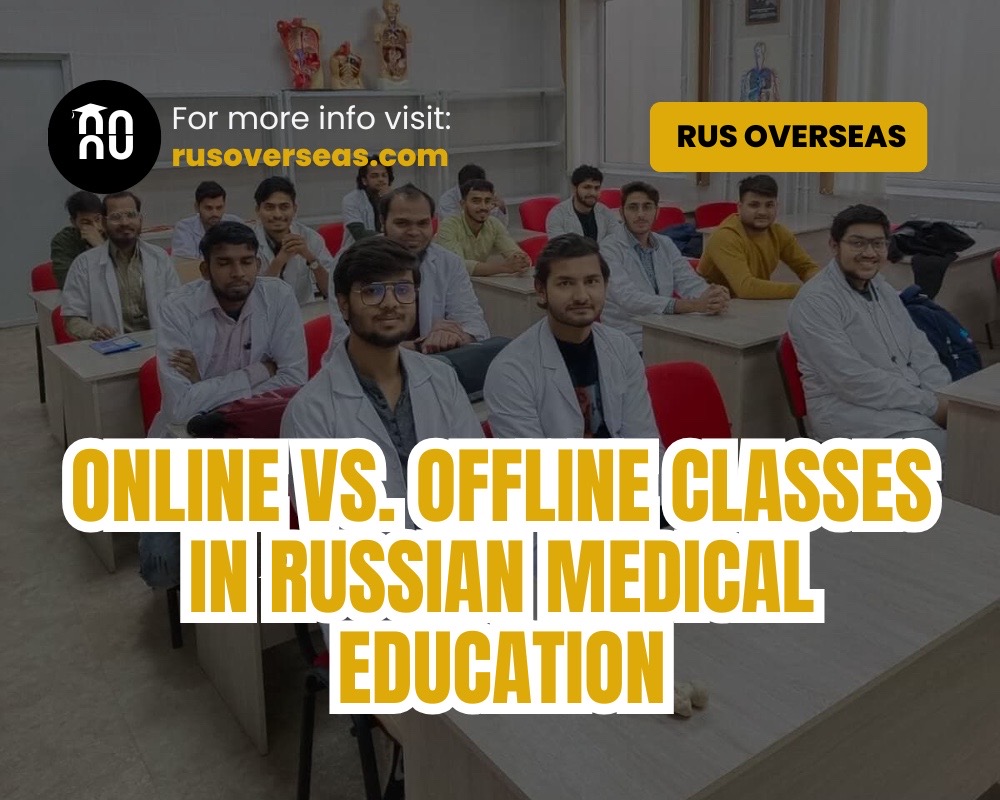Online vs. Offline Classes in Russian Medical Education.

Okay, so you're thinking of studying medicine in Russia. You do you! But then you've got this massive choice to make: online or on-campus classes? Both have their pros and cons, so let's dive in.
The On-Campus Experience: The Old School Approach
Old school on-campus study in Russia is the route that most take. You'll be there in the thick of it, surrounded by others, with a face-to-face presence to lecturers and buildings.
Best of all:
• Practical Learning: It's not school of medicine theory; it's practical learning. Personal classes introduce you to labs, dissection, and clinical rotations that are vital to your development as a doctor.
• One-on-One Interaction: You are able to question, discuss, and get instant feedback from teaching assistants and instructors. This kind of interaction is really significant, especially in a challenging profession like medicine.
• Networking Opportunities: You'll have a network of colleagues and instructors, a treasure untold in your working life. Connecting is included with the package!
• Immersive Cultural Experience: Living in Russia allows you to better appreciate the culture, substance to the learning experience. And then there's the big adventure!
But, the not-so-good stuff
• Cost: Study on campus in Russia is expensive, especially when you factor in accommodation, transport, and living expenses.
• Location: You will need to relocate to Russia for the length of the course. This may mean missing out on time with family and friends.
• Strict Schedule: Medical school is demanding, and study on campus typically entails a very intense and demanding schedule.
• Language Barrier: Your course is not completely English-taught, so you will need to learn Russian, and that is another snag.
The Online Option: Flexibility and Accessibility
Online medical education is a recent innovation, and it is getting increasingly popular because it is flexible and accessible.
Here's the plus side:
• Flexibility: The online courses are flexible in timing and where you learn. You learn at your own convenience, and you will not have to relocate to Russia. It is convenient for a person who has other commitments or who would like to learn in familiar settings.
• Accessibility: Distance learning could be simpler for students who might not be able to travel or facilitate constant face-to-face learning.
• Cost Savings: Online courses cost less than traditional ones because you don't carry the same living expenses that you would while studying abroad.
• Recorded Lectures: Recorded lectures are used in most online courses, so you can watch and learn at your own speed. They're particularly useful when learning complex information.
But there's a catch:
• Reduced Hands-on Experience: You may not enjoy the same level of hands-on learning experience as on campus. Lab and clinical rotations are not necessarily replicated online.
• Reduced Interaction: It is more difficult to interact with students and instructors in an online classroom.
• Needs Self-Discipline: There must be high self-discipline and motivation in successful online learning. You would need to manage your time yourself and stay motivated in the absence of a classroom environment.
• Is Technology Dependent: Successful online education requires an uninterrupted internet connection and technical know-how. This can be tricky in the event of a technical problem.
The Verdict? It Depends On You
The optimum choice—campus or online—actually relies solely on your own circumstance, learning method, and priority. If you like hands-on learning, cultural immersion, and face-to-face contact with the teachers, then campus education would be the best option. If flexibility, convenience, and cost are your number one priorities, then online may be an alternative.
Research the individual programs you're considering, comparing the pros and cons of each type of program. Interview current students, faculty, and career advisors to get more information about the programs from their point of view. Choosing the proper study setting is a colossal step towards gearing yourself up for ultimate success in your medical profession.
SIMPLE ADMISSION PROCESS
No hefty donations, no entrance exams, no hassle for documentation just your dream MBBS study and you. RUS OVERSEAS does everything for you from scratch. We make sure you don’t have to do rounds of rotation and get fed up with the process of admission. From beginning to end, we are with you.
THE PROCESS
Eligibility:
- 50% in PCB (40% for SC/ST/OBC) in Class 12.
- Minimum 17 years by December 31 of the admission year.
- NEET Qualification: Mandatory for Indian students.
Invitation letter:
After RUS OVERSEAS submits your documents in the university. The university issues you an invitation letter.
Visa process:
Once the invitation letter arrives. The company will start your visa processing and in a few days you will be on the plane to Russia.
HOW RUS OVERSEAS HELPS YOU IN YOUR JOURNEY
RUS OVERSEAS has the experience of more than a decade. Our team is supportive and cares for the students wholeheartedly. We are available 24/7. Your one stop solution for MBBS abroad is us. We at RUS OVERSEAS will never disappoint any student or parent in their fulfilling journey with us.
CONTACT US
Phone: +91 9560533703
Email: info@rusoverseas.com
Rus Overseas provides expert assistance in choosing the right program, application processing, visa support, and settling in Russia. Contact us today to begin your abroad journey in Russia!
Sakib Hasan

